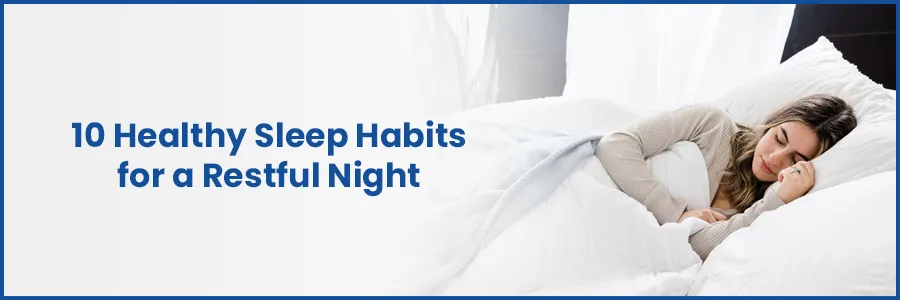- Cardiology 84
- Dermatology 45
- Endocrinology 33
- ENT 16
- Fertility 190
- Gastroenterology 78
- General-Medicine 81
- Gynecology 80
- Hematology 19
- Infectious-Diseases 33
- Neurology 52
- Oncology 34
- Ophthalmology 23
- Orthopedics 69
- Pediatrics 31
- Procedure 23
- Public-Health 144
- Pulmonology 59
- Radiology 8
- Urology 68
- Wellness 161
- Woman-and-child 77

Healthy Sleep Habits For Ultimate Sleep Improvement
Sleep is not merely a luxury; it's a fundamental pillar of well-being. Sleep quality directly influences your physical health, mental clarity, and emotional balance. By cultivating healthy sleep habits, you can unlock the door to refreshing and rejuvenating nights. This comprehensive guide delves into 10 essential sleep habits to achieve deep, healthy sleep habits for adutls and older adults
Secure your health with a second opinion. Make informed decisions and book your appointment today!
Get A Second Opinion10 Healthy Sleeping Habits for a Restful Night
- Maintain a Consistent Sleep Schedule : Go to bed and wake up at the same time every day, even on weekends.
- Create a Relaxing Bedtime Routine : Before bed, engage in calming activities like reading, taking a warm bath, or practicing meditation.
- Limit Exposure to Screens Before Bed : Avoid using electronic devices at least an hour before bedtime, as the blue light can interfere with your sleep.
- Make Your Sleep Environment Comfortable : Ensure your bedroom is dark, quiet, and cool. If necessary, use earplugs, an eye mask, or a white noise machine.
- Invest in a Good Mattress and Pillows : A comfortable and supportive mattress and pillows can significantly impact the quality of your sleep.
- Be Mindful of Your Diet : Avoid large meals, caffeine, and alcohol close to bedtime, as they can disrupt sleep.
- Get Regular Exercise : Engage in regular physical activity, but try to avoid vigorous exercise close to bedtime.
- Manage Stress and Anxiety : Practice relaxation techniques such as deep breathing, meditation, or yoga to reduce stress and anxiety before bed.
- Limit Naps : If you need to nap, try to keep it short (20-30 minutes) and avoid napping late in the day.
- Expose Yourself to Natural Light : Spend time outside during the day to help regulate your body's internal clock.
- Avoid Drinking Too Much Before Bed : To minimize trips to the bathroom during the night, limit your fluid intake in the evening.
- Seek Professional Help if Needed : If you continue to have trouble sleeping, consider consulting a healthcare professional or sleep specialist.
Ready to take control of your health journey? Book your appointment now and start your path towards wellness today!
Book an AppointmentConclusion
Mastering healthy sleep habits is a transformative journey toward optimal well-being. Incorporating these ten practices into your daily routine lays the foundation for restful nights and vibrant days. Remember that establishing new habits takes time, so be patient with yourself. As you make these habits a part of your lifestyle, you'll unlock the full potential of rejuvenating sleep and embrace a more fulfilled life.
Frequently Asked Questions
Eating foods high in tryptophan like turkey, nuts, and seeds, or foods rich in magnesium such as bananas and dark chocolate, can promote better sleep. Avoid heavy or spicy meals close to bedtime.
Most adults need between 7-9 hours of sleep per night for optimal health and well-being. Individual sleep needs can vary, but consistently getting enough sleep is crucial.
Effective relaxation techniques before bedtime include practicing deep breathing exercises, meditation, taking a warm bath, or reading a book. Avoiding screens and bright lights can also help signal to your body that it's time to wind down.
The use of a pillow largely depends on personal preference and sleeping position. Pillows can support the neck and spine alignment, promoting better comfort and sleep quality for many people.
Regular exercise, particularly aerobic exercise like walking or jogging, can improve sleep quality by helping you fall asleep faster and enjoy deeper sleep. However, avoid vigorous exercise close to bedtime as it may be stimulating.
Screens emit blue light that can interfere with the production of melatonin, a hormone that regulates sleep. To reduce its impact, limit screen time before bed, use night mode settings on devices, or wear blue-light-blocking glasses.
Sleep hygiene refers to practices and habits that promote quality sleep. This includes maintaining a consistent sleep schedule, creating a comfortable sleep environment, and adopting relaxing bedtime routines. Good sleep hygiene is essential for getting restorative sleep.
Yes, certain herbal teas like chamomile or valerian root tea, and warm milk, contain compounds that can promote relaxation and help improve sleep quality. Enjoying these beverages as part of a bedtime routine can signal to your body that it's time to unwind and prepare for sleep.

- Cardiology 2132
- Dermatology 168
- Endocrinology 135
- ENT 97
- Fertility 217
- Gastroenterology 232
- General 478
- General-Medicine 1685
- Gynecology 169
- Hematology 85
- Infectious-Diseases 208
- Neurology 207
- Oncology 345
- Ophthalmology 65
- Orthopedics 187
- Pediatrics 83
- Procedure 72
- Public-Health 209
- Pulmonology 126
- Radiology 13
- Second Opinion 311
- Urology 294
- Wellness 600
- Woman-and-child 447
- Others 10217
Related Blogs
If you have any questions, please fill out the enquiry form or call us, and we will get back to you promptly.
040-68334455